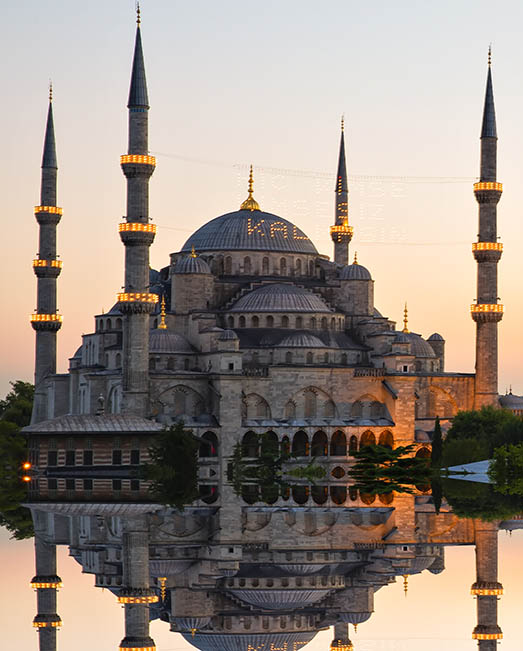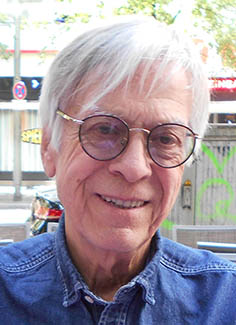Global
Copyright@ Australian Catholic University 1998-2026 | ABN 15 050 192 660 CRICOS registered provider: 00004G | PRV12008
Copyright@ Australian Catholic University 1998-2026 | ABN 15 050 192 660 CRICOS registered provider: 00004G | PRV12008

Somewhere in Birmingham, England in the early 1960s, at the beginning of the Cold War, an unassuming teenage schoolboy from a working-class family was invited on a long trip to Russia via East Berlin and Warsaw with a group of young men. The boy was Bryan S. Turner, and he was, by his own admission, “quite a small person”.
“I was just an ordinary young secular boy interested in cricket and girls,” he says. “Very early on it dawned on me that there was no way I was going to make it in cricket, because I was way too small to be a fast overarm bowler.”
With the bat-and-ball packed away and the gentleman’s game ruled out as a career prospect, Bryan started to become interested in politics. At secondary school, most of his friends were Jewish kids.
“They were sons of refugee Jews who’d come to Britain to escape Nazism,” he says. “A lot these schoolboys were very politically motivated, mainly by listening to the stories of their parents who’d managed to escape from Germany.”
One of them encouraged Bryan to go on this very long trip to Russia. While the tour was filled with adventure, it was also exhausting. They travelled mostly on slow, cramped trains with very little food.
“It was tiring at times, but it was fascinating,” he says. “We went to many countries and met lots of interesting young people, and we ended up in Helsinki where the famous Russian poet Yevgeny Yevtushenko turned up.”
Eventually, Bryan became aware that the trip was organised by the Young Communist League, the youth section of the Communist Party of Great Britain.
The tour had a great effect on the youngster, who would go on to become one of the world’s most celebrated sociologists.
“It transformed my view about politics, and made me want to understand the differences between capitalism and communism,” says Bryan Turner, now 76, from his office in Sydney, where he’s a Professor of Sociology at ACU’s Institute for Humanities and Social Sciences.
“Then, partly by accident I think, I went on a trip to Greece with young Methodists and was kind of converted – well, I won’t say ‘kind of’ – I was converted to Christianity. I joined the Methodist Society, started reading the theology of John Wesley, and ended up pursuing an academic career in the sociology of religion.”
He might not have made it as a cricketer, but Bryan did make the most of being small in stature.
“The unintended consequence was that I became quite a famous professor of sociology, so perhaps I shouldn’t complain about being five-foot-six.”
Bryan Turner cut a path in the academic world at the University of Leeds under the tutelage of Trevor Ling, a pioneer of the comparative sociology of religions – a field that studies the beliefs, practices and organisational forms of religion using the methods of sociology.
Over the course of his career, Professor Turner’s interest in religion and society has led him to expound and compare various faiths – and to question his own.
“Often the explanation that happens in sociology of religion tends to dent your understanding of your faith, and I think that happened to me,” he says.
“I was still a practicing Christian as a young man. I married a woman who came from a strong Methodist family, so I remember on our wedding day we only had cups of tea – there was no alcohol around anywhere.
“But eventually I drifted through Methodism and Anglicanism and became more a curious student of religion, rather than actually practicing it.”
In the 1970s, Professor Turner began to explore the sociology of Islam, and in 1974 published his first major book Weber and Islam, which laid the foundation of his academic career. Generously reviewed by the influential social anthropologist Ernest Gellner, the book bolstered Turner’s status as a world-class scholar of religion and comparative sociology.
“I remember the first sentence of Gellner’s review was, ‘This is a laudable book’, full stop,” he says. “As an early career academic, you couldn’t have had a better pat on the back from such a famous scholar.”
Favourable reviews were to become a feature of Bryan Turner’s career.
When he moved to Scotland to lecture at the University of Aberdeen, his research interests turned to medical sociology – an area he continues to study to this day. In 1984 he published The Body and Society, a book which, according to his peers, “revolutionised the way in which we think about ourselves and our bodies”.
But after more than a decade exploring the human body and other topics in medical sociology, he was drawn back to the sociology of religion on September 11 2001, when two planes crashed into New York’s World Trade Centre.
“I’d honestly put the sociology of religion on the back-boiler years earlier to secure my career as an academic, because I had very few students interested in religion at the time,” says Professor Turner, who went on to research and teach the subject at Wellesley College and City University of New York.
“Then 9/11 changed everything. People who knew nothing about Islam became so-called ‘experts’ overnight, and journalists from the BBC and the newspapers were madly searching for academics who actually knew what they were talking about.”
Professor Turner’s expertise on the subject was swiftly put to use. He’s now considered one of the world’s foremost experts on the relationship between Islam and the West, with a focus on globalisation and religion, religious conflict and the modern state, and human rights and religion.
In his writing and his teaching, he tries to make religions relevant to the world his students are living in – a difficult-but-important task in a society that is, according to the dominant paradigm, increasingly secular.
“Sociologists talk a lot about the secularisation of the modern world, but religion still seems to play a major role in politics,” says Professor Turner, who published The Sociology of Islam, a collection of his essays on the topic, in 2013.
“I think that sociology can contribute in a positive way by taking note of the fact that religion is a serious issue, and one that is worthy of deep thought and consideration.”
And despite the fact that he has “drifted away from the church”, he still sees value in “the communal life that the church makes possible”.
“I’ve written a lot recently about the notion of happiness, and my argument is that you can’t be happy as an individual – you can only be happy in the context of a happy community,” he says.
“I think what religion gives people is the prospect of a communal life, lived with others, against the norms of individualism. And so the message of my type of sociology is a plea for a communal life, and a life that’s seriously lived.”
Professor Turner is not a social activist in the traditional sense.
“I have to admit,” he says, “I’m a slightly passive sociologist … I don’t go on marches a great deal, for example, but I do have very strong political views.”
He’s been a critic of neo-liberal economics, and came to Australia “as a refugee from Thatcherism”. He thinks British PM Boris Johnson is “a disaster”, and former US President Donald Trump was “even worse”.
But in general, he prefers his contribution to be made through the written word.
“A lot of people say I write very well,” he says. “Perhaps naively, I hope that my books, which have been translated into many languages and read by lots of people, I hope they’ve had an impact on people’s lives.”
Professor Turner continues to write and lecture prolifically on subjects that are relevant to modern society, including the impact of COVID-19, which he labels “a true catastrophe”, the rise of male-dominated far-right groups in Australia, and medical science’s promise to extend the human lifespan, a topic he recently discussed in an Oxford Union debate on immortality.
He may be small in stature, but Bryan’s contribution to sociology has been undeniably big.
“The problem of being small – of having a small body – it has always struck me as an obvious disadvantage, and its consequences are real,” Professor Turner says.
“I was never going to be a cricketer, so I took up sociology. I’ve got the body I’ve got. This five-foot-six body has taken me so far through seven decades, and I hope it keeps going.”
Professor Bryan Turner is one of the world’s leading sociologists of religion. He has received several honorary degrees recognising his contributions to sociology, most recently Doctor of Letters from the University of Cambridge. He is Professor of Sociology at ACU’s Institute for Humanities and Social Sciences.

Copyright@ Australian Catholic University 1998-2026 | ABN 15 050 192 660 CRICOS registered provider: 00004G | PRV12008